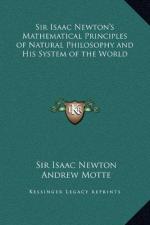|
This section contains 3,676 words (approx. 13 pages at 300 words per page) |

|
Isaac Newton formulated the theory of universal gravity, was an inventor of the calculus, and made major discoveries in optics. He has long been regarded as, perhaps, the greatest scientist and as one of the greatest mathematicians ever to have lived. More recently, philosophers have begun to appreciate the extent to which Newton's remarks on scientific method illuminate the seminal contribution he made, especially in his Principia, to the transformation of natural philosophy into the physical sciences as we know them today. We now know, also, that Newton put at least as much effort into alchemy and theology as he did into his celebrated contributions to mathematics and science.
Life
Newton entered Trinity College Cambridge in 1661. In what has come to be called his annus mirabilis, he spent much of 1665 and 1666 at his family home in Woolsthorp while the university was closed because of...
|
This section contains 3,676 words (approx. 13 pages at 300 words per page) |

|


